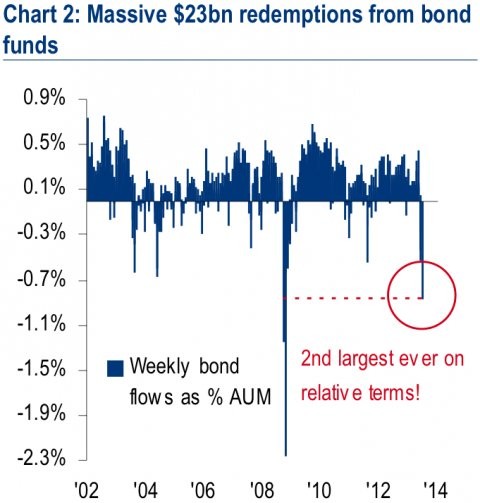Beware Of Hidden Derivatives Fund China
Post on: 1 Июль, 2015 No Comment

Beware Of Hidden Derivatives
Published: 19:20, June 23rd, 2007
By: George D. Lambert
Like millions of investors, theres a good chance you own mutual funds that you believe are conservative by nature. These could include diversified stock funds and bond funds.
However, managers might hold derivatives in your funds portfolio, and you might not even be aware of it. Why should that matter? Well, the good news is that derivatives can boost returns. The not-so-good news is that they also come with increases in risk and tax liabilities.
Three Common Derivatives
Institutional investors, such as hedge funds and banks, have used derivatives for years; however, now the following three derivatives are showing up in many stock and bond funds owned by small investors.
Commercial real estate is still rocking. Click here for Peter Slatin’s model portfolio of REITs for income and capital gains in the Forbes / Slatin Real Estate Report.
Credit Default Swaps
A credit default swap is a type of credit risk insurance against a company or country defaulting on its debt. Its price is based on the probabilities that the debtor will default on its creditors or experience a change in its credit rating.
Special offer: Have your investment returns been double those of the market for the past 10 years? Janet Browns have. Her NoLoad Fund*X mutual fund model portfolio has returned more than 17% a year since 1996. Click here for her top picks from Fidelity, Vanguard and T. Rowe Price.
The swap buyer pays a fee to the seller, and the seller agrees to pay the buyer in case of a default. Therefore, a credit default swap provides the buyer with protection against specific risks. For example, a big corporate bond investor, such as a pension fund, might buy credit default swaps for protection against a default by the issuers of corporate bonds it holds.
Some mutual fund managers, though, have gotten creative in their use of swaps; they have found that swaps can be easier and cheaper to trade than corporate bonds. And by going long or short, its a simple way to make money or increase or decrease their portfolios credit risk.
The problem is that swaps are not securities. They are generally agreements between a mutual fund and a Wall Street firm and typically dont trade on an exchange. This means that there is no way for outsiders, such as the Securities and Exchange Commission (SEC), to know how much risk any given institution has taken on.
Consequently, as the popularity of using swaps increases, the risk goes up that the banks selling the swaps will not be able to meet their obligations if a major default occurs. (To learn more about this subject, see Corporate Use Of Derivatives For Hedging and How do companies benefit from interest rate and currency swaps?)
Special Offer: The value of derivatives based just on bonds has more than doubled in the past three years to $29 trillion. Is all of this leverage setting up the global financial system for a major catastrophe? How can you protect your assets? Click here for recommendations and analysis from Jim Stack in InvesTech Research.
Covered Calls
A covered call, or writing a covered call, is nothing new for investors. You sell a call option on a stock you own. The option gives the buyer the right, but not the obligation, to buy your stock within a set time at a specified strike price.
There are fund managers who are now getting in on covered calls. They probably see it as a way to boost their funds income, which can be especially attractive when interest rates are low. Plus, it provides a little downside protection in case of a minor market dip.
However, suppose the stock blasts off? The fund would give up all of the stocks profit above the strike price as the call holder exercises the option. (Keep reading about covered calls in Using LEAPS In A Covered Call Write, An Alternative Covered Call: Adding A Leg, An Alternative Covered Call Options Trading Strategy and Come One, Come AllCovered Calls.)
Index Tracking
Is your fund managers goal to outperform an index, such as the S&P 500? Its possible then, that the manager might invest most of the funds money in bonds and a small portion in index derivatives, such as options or futures contracts.
But what if your managers goal is loftier?

For instance, some funds seek to outperform daily index returns by a multiple, like two times, or track commodity prices. In such cases, theyre most likely using derivatives. And even though small upward market movements can dramatically increase your funds value, such a strategy could also backfire during a broad market downturn because index losses will be amplified. (To learn more about investing in indexes, see You Cant Judge an Index Fund by Its Cover, The Lowdown On Index Funds and The ABCs Of Stock Indexes.)
Tax Concerns
Funds that use derivatives frequently trade their holdings. This can mean more short-term gains for shareholders, and you could lose up to 35% of those gains to federal income tax.
Special Offer: Focus Media Holdings (FMCN) has more than tripled since John Christy recommended it in December 2005. But is it still a buy near $44? Click here for guidance, and a complete list of international stocks to buy now, in the Forbes International Investment Report.
Does your fund manager use derivatives?
You can go through your funds prospectus to see whether its manager is allowed to use derivatives and how they may be used. In addition, the quarterly reports should show derivative investments held in the fund. (To find out more, see Dont Forget To Read The Prospectus! and Digging Deeper: The Mutual Fund Prospectus.)
You can also check out the fund companys Web site or the SECs Filings and Forms site. But, make sure you look beyond the percentages. For example, suppose your fund shows that 72% of its assets are in derivatives, but when you check further, you find that 70% is in U.S. Treasury futures and 2% in credit default swaps. Thats a heck of a lot less risky than if those numbers were reversed.
Shrewd Strategy or Smoke and Mirrors?
Derivatives in a mutual fund can reduce risks and boost returns. However, this strategy generally works best in flat markets, not markets that are swinging wildly.
Nevertheless, you can expect their use to increase as yield-hungry baby boomers retire and seek higher income from their investments. And with more than 8,000 mutual funds out there, managers often think its not good enough to match a markets index. They want to beat itand they are willing to bet your money that they can do it, even if it means bypassing the older, simpler products and betting on derivatives.
George D. Lambert is a freelance financial writer with more than 20 years of experience in the financial services industry. He has worked as a certified financial planner, a certified divorce financial analyst and an arbitrator for the NASD, NYSE and AAA.














